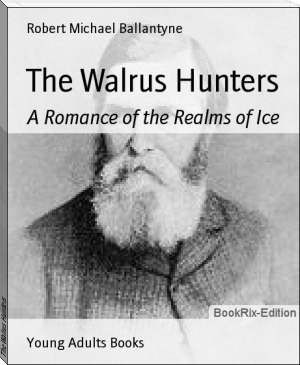The Walrus Hunters by Robert Michael Ballantyne (i wanna iguana read aloud TXT) 📕

Read free book «The Walrus Hunters by Robert Michael Ballantyne (i wanna iguana read aloud TXT) 📕» - read online or download for free at americanlibrarybooks.com
- Author: Robert Michael Ballantyne
Read book online «The Walrus Hunters by Robert Michael Ballantyne (i wanna iguana read aloud TXT) 📕». Author - Robert Michael Ballantyne
Need we say that joy filled the Indian's heart that night, and a feeling of gratitude to that mysterious ever-present yet never visible Being, who--he had come to recognise in his philosophical way--must be the author of all good, though his philosophy failed to tell him who was the author of evil. Nazinred was not by any means the first savage philosopher who has puzzled himself with that question, but it is due to him to add--for it proves him more scientific than many trained philosophers of the present day--that he did not plead his ignorance about his Creator as an excuse for ingratitude, much less as a reason for denying His existence altogether.
But there was a surprise in store for our Indian chief which went far to increase his grateful feelings, as well as to determine his future course. On looking about the deserted village the following day for further evidences of his child having been there, he came upon a post with a piece of birch-bark fastened to it. The post was fixed in the ice close to the shore, where in summer-time the land and sea were wont to meet, and from which point tracks in the snow gave clear indication that the Eskimos had taken their departure. This post with its piece of bark was neither more nor less than a letter, such as unlettered men in all ages have used for holding intercourse with absent friends.
Knowing her father's love for her, and suspecting that, sooner or later, he would organise a search party--though it never occurred to her that he would be so wild as to undertake the search alone--Adolay had erected the post when the tribe set out for winter quarters, and had fixed the bark letter to it for his guidance.
The writing on the letter, we need hardly say, was figurative, brief, and easily read. It did not give the intelligent father much trouble in the decipherment. At the top was the picture of a hand fairly, if not elegantly, drawn, with one finger pointing. Below it were several figures, the last of which was a girl in unmistakable Indian costume. The figure in front of her was meant to represent Cheenbuk; in advance of him was an Eskimo woman with her tail flowing gracefully behind, while before her was a hazy group of men, women, and children, which represented the tribe on the march. Adolay had obviously the artistic gift in embryo, for there was a decided effort to indicate form and motion, as well as to suggest an idea of perspective, for the woman and the tribal group were drawn much smaller than the foreground figures, and were placed on higher planes. The sketchiness of the group, too, also told of just ideas as to relative degrees of interest in the legend, while the undue prominence of the leading facial feature was an attempt to give that advice which is so forcibly expressed in the well-known phrase, "Follow your nose." Ten dots underneath, with a group of snow-huts at the end of them, were not so clear at first, but in the end Nazinred made out a sentence, of which the following may be given as a free-and-easy translation:
"My hand points the direction in which we have gone. Your loving daughter is following the man who ran away with her. The Eskimo women and men, and dogs, and all the rest of them, are marching before us. Follow me for ten days, and you will come to the snow-huts where we are to winter."
Could anything be plainer? The happy father thought not. He took an extra meal. His team gave themselves an extra feed of bits of old blubber picked up in the camp, and while daylight was still engaged in its brave though hopeless struggle with the Arctic night, he tied up his sledge, thrust the old moccasin into his bosom, gave Attim the order to advance, and set off with revived strength and hope on his now hopeful journey.
CHAPTER EIGHTEEN.
A SURPRISE AND A CATASTROPHE.
The trail of the Eskimos as they traversed the frozen sea, although not always very distinct on the hard snow, was as plain as a highway to one so skilled in tracking as the Indian chief Nazinred. The weather having been clear and calm ever since he left home, the marks had not been obliterated, and he pursued his way without halt or hesitation.
But on the fourth day out there came symptoms of a change. The chief had adopted the plan of travelling during every hour of the short day, or twilight, in order to make more sure of not missing the trail, and the stars with frequent aurora borealis had made each night so brilliant that he advanced almost as easily as during the day-time. The fourth day, however, on awaking, his ears were greeted with sounds that caused him to rise in haste and force out the door of his sleeping hut, when to his dismay he found that a furious gale was blowing, that the sky was black, and that he could hardly see the poor dogs, whom he found crouching as close as possible on the sheltered side of the hut. In these circumstances, to advance without losing his way was impossible, so that he was compelled to make the most of his time by sleeping as much as he could.
To do him justice he possessed a wonderful capacity in that way. Having put the sledge outside in order to make room, he called all the dogs in, resolving that the poor things should not be exposed to the pitiless storm. Then, having fed himself and them, he lay down with them and was soon in happy oblivion.
Of course he had no artificial means of measuring time, and, the sky being overclouded, darkness visible pervaded the region. But a healthy stomach helped in some degree to furnish a natural chronometer, and its condition when he awoke suggested that he must have slept till near daylight of the following day. Rousing the dogs, he gave them a feed, ate heartily himself, and then went out to look at the weather.
The sight which the grey dawn rendered barely visible was one which caused him to return to the hut with extreme promptitude for his gun, for, about fifty yards off, were two white polar bears of apparently, colossal size, frolicking about in a curious manner, and evidently amusing themselves with something. The something turned out to be the chief's sledge, which the bears had unpacked; eating whatever they had a fancy for, scattering about what they did not want, smashing the sledge itself to pieces, and twisting the leathern wraps and cordage into unimaginable knots.
Nazinred did not discover all this at once, being too much excited by the unexpected visit to note trifling details. Besides, prompt action was necessary, for the four dogs, on becoming aware of what was transacting outside, made a united and clamorous dash at the foe. Two of them, being too valorous, ran close up to the bears, who seemed to regard them with haughty surprise. Another movement and the two dogs rose into the air with a yell in unison, and fell back upon the snow, where they lay motionless. The other two, learning wisdom from experience, kept back and barked furiously.
Nazinred, although taken by surprise, was used to sudden alarms and not easily frightened. Knowing that the two dogs were very courageous, and therefore all the more likely to run into danger, he sprang forward towards the nearer of the two bears. It rose on its hind-legs to receive him, and in this position appeared to stand at least eight feet high. Without a moment's hesitation the Indian pointed his gun when the muzzle was not more than a foot from the creature's breast, and fired. The bear fell dead on the instant, shot through the heart.
The loud report and flash frightened the other bear away. It was closely followed, however, by the dogs, and the chief availed himself of the opportunity to re-load. While he was thus engaged a peculiarly loud yell told only too plainly that one of the remaining dogs was injured, if not killed. He called to the remaining one to come back. Obedient to the call it returned, and, to its master's great relief, proved to be his favourite Attim, a good deal cut about the shoulders and much crestfallen, but not seriously injured.
"Down, Attim," said his master.
The poor creature obeyed at once, and his master hurried forward, but the bear had retired.
The result of this encounter was that three of the dogs were killed, many of his things destroyed, and his provisions rendered almost useless, while the sledge was irreparably broken to pieces. There was daylight enough to render the extent of his misfortune visible, and to show him that the trail which he had been following so long was drifted over and entirely obliterated.
To a man of weak resolution this might have been overwhelming, but Nazinred was very much the reverse of weak, and his utter recklessness of life in his endeavour to recover his lost child would have rendered him a hero for the time being, even if he had not been one by nature.
After collecting the remains of his property, and ascertaining that the sledge was hopelessly destroyed, he made up his mind to carry the provisions on his back and push forward in the direction pointed out by Adolay until he found her. If he did not succeed, the failure of his food would soon end the struggle.
It was some consolation to the unfortunate man that his favourite dog had been spared. The amount of "company" afforded even by an ordinary dog is well-known, but the civilised world can but feebly understand the value of a more than usually affectionate creature in the forlorn circumstances in which our Indian was now placed. Like many other people, he had got into the habit of talking to the dog about himself and his affairs, as if it were human. Whether he held the opinion we have heard so often expressed that "he understands every word I say," we cannot tell, but the gravity of his expression and the solemnity of his tone when conversing with it, encouraged that belief, and the very earnest attention of the dog almost justified it.
But the friendly feelings existing between them did not relax the chief's notions of discipline. Attim was not permitted to follow his master as an idle companion. He was made to carry, or rather to drag, his own food, by means of a collar with two pieces of stick attached, the ends of which trailed on the ice, thus forming as it were a pair of trains without wheels. This is a simple contrivance, largely used by the prairie Indians with their horses as well as dogs. The two sticks or poles, being long, project a good way behind the animal, thus leaving space for a load. As the poles are





Comments (0)